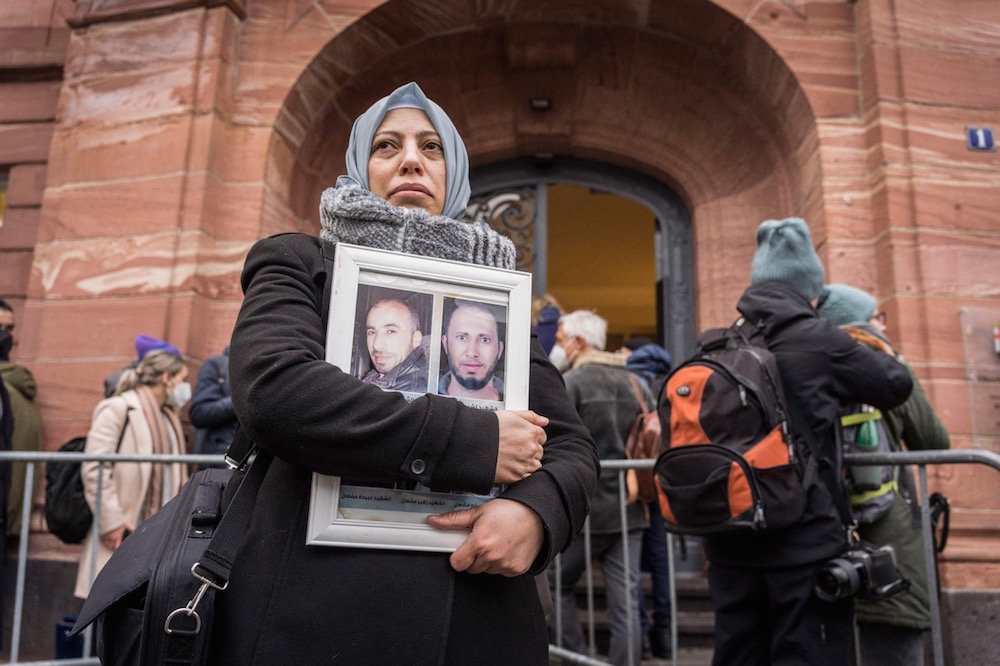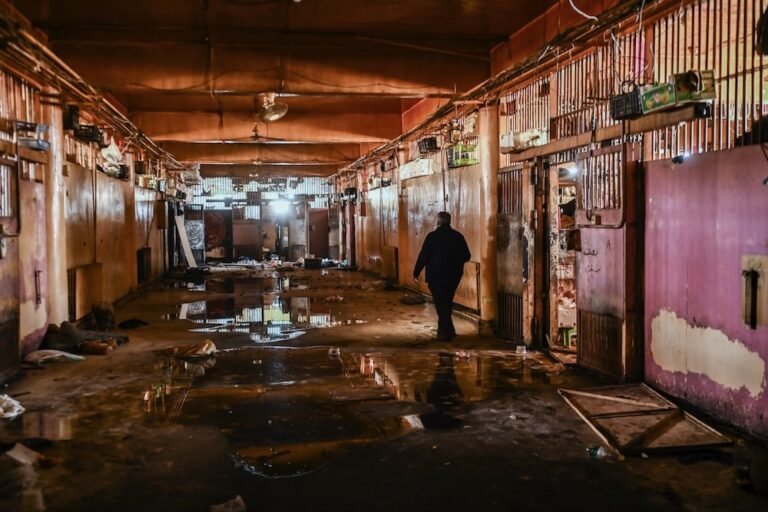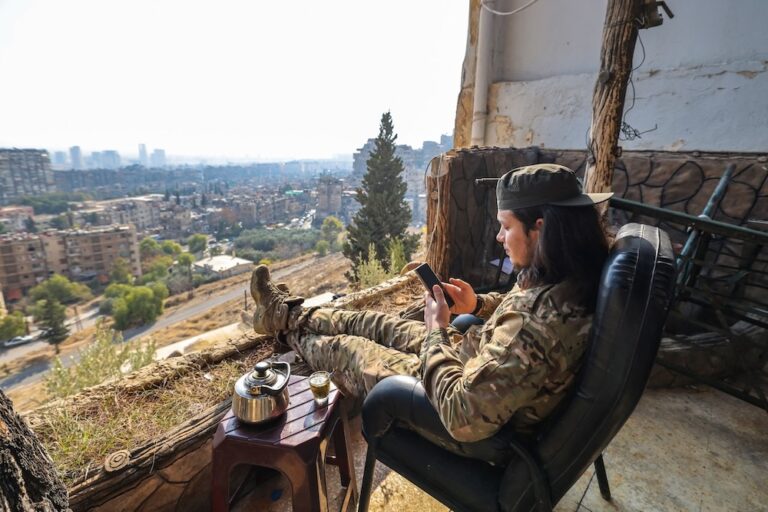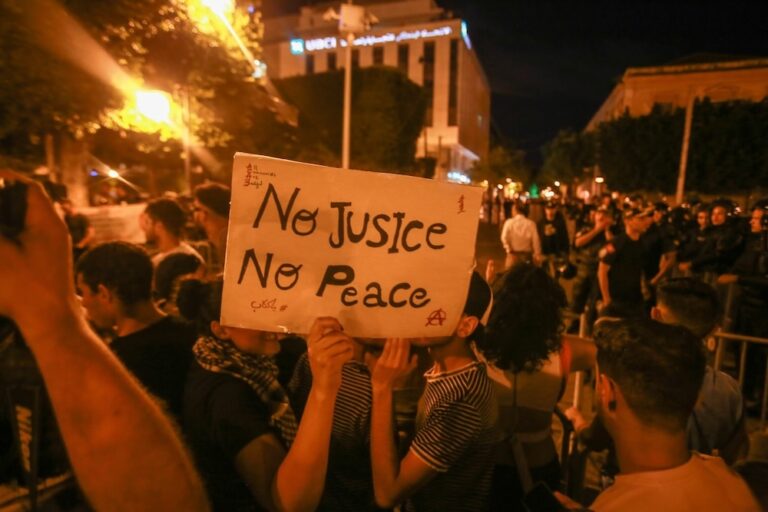January 2022 in Middle East and North Africa: A free expression roundup produced by IFEX's Regional Editor Naseem Tarawnah, based on IFEX member reports and news from the region.
Holding Syrian torturers accountable. Civil society’s struggles to survive Egypt’s ‘republic of fear’. Medical neglect of Iran’s political prisoners battling COVID-19. The chilling impact of digital surveillance on women activists in the region.
Syria: Landmark verdict a step towards accountability
The new year began with some movement towards justice for victims of the Syrian government’s atrocities. First, a German court in Koblenz sentenced Anwar Raslan, a former colonel in the Syrian intelligence, to life imprisonment for crimes against humanity. The historic trial’s verdict was the culmination of tireless work by human rights lawyers and organizations, as well as the 80 witnesses and survivors, whose testimonies helped expose the breadth of atrocities in Syria’s detention centres and security branches.
Syrian journalist Amer Matar was one such witness, testifying against Raslan last April. Matar said he endured extensive torture during the eight months he was held in a Syrian prison where Raslan was head of investigations. “As a journalist, the verdict represents some accountability for me personally, to know that those who jailed and interrogated me over and over in custody over every word I wrote are facing consequences,” Matar told CPJ in an interview.
“In my dreams, I wish I had met Raslan again in Syria, that justice could happen inside our country. But I was beaten and tortured by many inside jail, not just Raslan, and in different detention centers. I saw children and elderly people being tortured everywhere I was held. That is all proof that the country is far from justice.”
Days after the Koblenz verdict, the trial of another Syrian official, Alaa M., began in Germany’s Higher Regional Court in Frankfurt. The former doctor is also accused of crimes against humanity, including premeditated murder and the brutal torture of detainees while working in military hospitals.
Rights groups, including IFEX member the Syrian Center for Media and Freedom of Expression (SCM), welcomed the steps taken by prosecutors and courts in Germany and other European countries to hold Syrian and non-Syrian war criminals accountable. In a joint statement, nine rights groups said that despite the growing justice deficit that has seen both “state and non-state actors in Syria continue to commit atrocities unhindered,” the landmark trial and verdict in Koblenz “offers hope that some justice can be and will be achieved for Syria’s many victims.”
Egypt: NGOs targeted and endemic impunity in the ‘Republic of fear’
After 18 years of tireless work in defending human rights and the right to free expression, one of Egypt’s most prominent rights organizations, IFEX member the Arabic Network for Human Rights Information (ANHRI), was forced to suspend its activities in response to repeated targeting by authorities. Over the years, ANHRI has faced increasingly blatant violations and persecution by authorities, ranging from office raids, travel bans, and website blocking, to asset freezes, defamation campaigns, and physical assaults on its members, including executive director Gamal Eid.
“We are suspending our institutional work and activities today, but we continue to be lawyers who have a conscience, and as individual, independent human rights defenders will work side by side with the few remaining independent human rights organizations, independent human rights defenders and the entire movement calling for democracy,” said Eid.
Expressing solidarity with ANHRI’s decision, IFEX member the Cairo Institute for Human Rights Studies (CIHRS) said: “the harassment and hostility faced by ANHRI and its founder Gamal Eid must be viewed in the context of the ongoing and vicious assault launched by state agencies against independent civil society organizations working in the field of human rights.”
According to Eid, ANHRI was prohibited from registering under the country’s new NGO law after being notified by authorities that their name needed to be changed, and that their extensive work on freedom of expression and prison conditions would be prohibited.
Egypt’s 2019 NGO law has forced independent organizations to re-register under the repressive law or face dissolution. Rights groups have repeatedly denounced the law, saying it empowers the government to deny registration to independent human rights organizations on vague grounds. Under the law’s severely restrictive framework, only “societal development” work aligned with the government’s plans is permitted, with any civic work authorities deem to be “political,” or violating “public order” or “morals”, being forbidden.
In response to reports that the 11 January 2022 deadline requiring organizations to register had been delayed for six months, rights groups called on Egypt’s parliament to repeal the law, and for international action to protect the country’s human rights movement and ensure the survival of independent civil society organizations.
The rights community celebrated the release of Egyptian-Palestinian rights activist Ramy Shaath, who was unjustifiably detained since July 2019 for his peaceful activism. Forced to renounce his Egyptian citizenship as a condition of his release, Shaath was deported to France where his wife resides, and has since started to sound the alarm on the country’s notorious prison conditions. “Egypt today is a big cell and we were in a much smaller one,” Shaath said in an interview weeks after his release.
Shaath also addressed the European Parliament last month, where he underscored how Egypt has “turned into a republic of fear, terrorizing human rights organizations and impeding their work.” Calling on the members of parliament to continue advocating for the release of Egypt’s political detainees, Shaath noted: “You succeeded in securing my release and that of some detainees, yet there are still 60 thousand Egyptians detained in draconian prisons without any justification and without any real hope for change unless we all act”.
Last month, two leaked videos published by The Guardian shed further light on the dire situation detainees face in Egypt’s prison system. “Watch how they are torturing us and our colleagues. They came and told us we’re next,” one detainee says in a covertly shot video showing detainees at el-Salam First police station being subjected to torture by authorities.
Egypt’s government announced it would be granting conditional releases for prisoners to commemorate “Police Day” and the January 25 Revolution, but would exclude those convicted of “crimes against the state,” like “spreading false information.” Meanwhile, the Biden administration announced it would be blocking $130 million in military aid to Egypt for failing to address specific human rights-related conditions set in September 2021. Rights groups welcomed the news with cautious optimism, pointing out that the Biden administration’s intended message to President Sisi’s repressive government was likely undercut by its announcement of a $2.5 billion arms sale to the country only days earlier.
Iran: Imprisoned critics deprived of medical care
PEN International called for an investigation into the tragic death of jailed poet Baktash Abtin, who passed away last month after battling COVID-19 he contracted at Evin Prison. Several inmates went on a hunger strike in protest of the writer and free speech activist’s death, which they, and rights groups, say was due to medical neglect by prison authorities.
Human Rights Watch (HRW) called Abtin’s death “emblematic of the dire situation Iranian authorities have created for imprisoned critics of the government,” and reiterated calls by rights groups earlier last month urging authorities to release those unjustly detained.
Reporters Without Borders (RSF) called on the UN to set up an independent international commission of inquiry into Abtin’s death, and raised concerns over other ailing imprisoned journalists, whose well-being remains at risk.
“Deprivation of medical care is deliberately used by the Iranian authorities as a way to eliminate imprisoned dissidents,” said Reza Moini, the head of RSF’s Iran-Afghanistan desk.
Imprisoned prominent rights defender Narges Mohammadi was sentenced to another eight years and 74 lashes for her peaceful activism. Detained since November 2021, Mohammadi is already serving a 30-month prison sentence and faces 80 lashes for “propaganda against the political system … [and] slander and rebellion against the prison administration”. Her trial last month reportedly lasted no longer than five minutes, and Mohammadi did not have access to a lawyer.
Meanwhile, exiled Iranian journalist Maryam Abasian spoke to the Committee to Protect Journalists (CPJ) on the dangers of being a queer journalist in Iran. Abasian was repeatedly interrogated by Iran’s Islamic Revolutionary Guard Corps (IRGC) over her social media posts and sexual orientation before fleeing the country in October 2021.
Describing the state of press freedoms in Iran, Abasian said: “There is a joke among Iranian journalists: ‘We have freedom of expression but we don’t have freedom after expression.’”
Online hate speech, cybercrime laws, and spyware targets women rights defenders
In the online civic space, hate speech on Israeli social networks saw an 8% rise last year according to new research by IFEX member the Arab Center for the Advancement of Social Media (7amleh). The organization monitored 620,000 conversations including violence and inciting speech against Arabs and Palestinians, recording an increase by 46,000 posts containing violent speech, compared with 574,000 in the previous year.
From online incitement to surveillance and censorship on social media platforms, 7amleh’s annual report, Hashtag Palestine, highlighted a year that was rife with violations of Palestinian digital rights.
In the UAE, rights groups say the over-broad and vague terminology of a new cybercrime law provides Emirati authorities with excessive discretion to criminalise and impose lengthy prison sentences on individuals exercising their rights to freedom of expression and peaceful assembly. The groups say the law also: “further enables the criminalization of the work of journalists, whistleblowers, activists and peaceful critics, subjecting those engaged in lawful activities to harsh prison sentences and excessive fines.”
In digital surveillance news, Lama Fakih, Crisis and Conflict director at HRW and head of the organization’s Beirut office, was targeted with NSO’s Pegasus spyware five times between April and August 2021, said the rights group last month.
“I’ve spent my entire career working to defend people’s rights, and now a government is trying to use me as a tool to undermine them. It’s paralyzing and chilling, and it’s why the stakes are so high when it comes to ending unlawful surveillance,” said Fakih.
Two prominent women human rights activists in the region, Ebtisam Al-Saegh in Bahrain and Hala Deeb in Jordan, were also targeted with Pegasus spyware, according to a recent investigation led by Front Line Defenders and Access Now.
“The impact of surveillance on women is particularly egregious and traumatizing, given how governments have weaponized personal information extracted through spyware to intimidate, harass and publicly smear the targets’ reputations,” said the report.
Lastly, in an effort to provide support and protection against spyware campaigns in the region, IFEX member Social Media Exchange (SMEX) announced last month the launch of its Forensic Analysis Unit, dedicated to analyzing the devices of activists, journalists and human rights defenders who suspect they are spyware targets.
In Brief
Bahrain: The IFEX network joined rights groups around the world in calling for the immediate release of imprisoned human rights defender Dr. Abduljalil AlSingace, who has been on hunger strike since July 2021. According to rights groups and family reports, AlSingace, who turned 60 last month, is still being denied his confiscated research, and has seen his health continue to decline during his ongoing hunger strike.
UAE: Emirati authorities retaliated against detained human rights defender Ahmed Mansoor after regional media published a letter he wrote from prison detailing his mistreatment. According to HRW and the Gulf Centre for Human Rights (GCHR), authorities moved Mansoor to a smaller and more isolated cell, denied him access to critical medical care, and confiscated his reading glasses in retaliation for the letter’s publication in July 2021.
“In addition to completely isolating him from the outside world and preventing him from accessing the necessary medical care, authorities are working systematically to psychologically break him down,” said Khalid Ibrahim, GCHR’s executive director. “This requires urgent action by all international mechanisms and governments concerned with human rights to save his life.”



